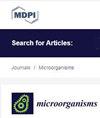Results of a Pilot Trial Assessing the Effects of Proper Oral Hygiene and a Probiotic Dietary Supplement on Oral Health in Volunteers with Oral Malodor
IF 4.1
2区 生物学
Q2 MICROBIOLOGY
引用次数: 0
Abstract
Persistent malodor affects many people worldwide and is usually associated with poor dental hygiene. This pilot trial aimed to determine whether proper dental hygiene (DH) and a probiotic dietary supplement support oral health in volunteers with persistent malodor. Volunteers (n = 35) were randomly assigned to the probiotic or placebo cohort. The probiotic cohort (n = 20) brushed and flossed their teeth twice daily and used probiotics for 30 days; the placebo cohort (n = 15) followed the same hygiene practices and used the placebo. The intervention phase was followed by a 30-day follow-up period. Measured outcomes were malodor and tongue-coating scores, probiotic DNA levels, salivary cytokines, and salivary pH. DH and probiotics significantly decreased malodor (~50% during intervention) and tongue coating scores (~45% during intervention). These changes remained through the course of the trial. The probiotic DNA levels increased in the probiotic cohort and dropped in the placebo cohort after the intervention started. The malodor moderately correlated with the tongue coating P. acidilactici level. The addition of probiotics increased IL-10 levels during the intervention and decreased IL-8, TNF-α, and IL-6 by the end of the study. People with malodor may benefit from using DH and probiotics. Additional trials are needed to definitively establish the benefits of probiotic dietary supplements.评估正确口腔卫生和益生菌膳食补充剂对口腔异味志愿者口腔健康影响的试点试验结果
持续的口腔异味影响着世界各地的许多人,通常与不良的牙齿卫生习惯有关。这项试点试验旨在确定适当的牙齿卫生(DH)和益生菌膳食补充剂是否有助于患有顽固性口臭的志愿者的口腔健康。志愿者(35 人)被随机分配到益生菌组或安慰剂组。益生菌组(n = 20)每天刷牙和使用牙线两次,并使用益生菌 30 天;安慰剂组(n = 15)遵循相同的卫生习惯,并使用安慰剂。干预阶段之后是 30 天的随访期。测量结果包括恶臭和舌苔评分、益生菌 DNA 水平、唾液细胞因子和唾液 pH 值。DH和益生菌能明显减少恶臭(干预期间约减少50%)和舌苔评分(干预期间约减少45%)。这些变化在试验过程中一直保持不变。干预开始后,益生菌队列中的益生菌 DNA 水平上升,而安慰剂队列中的水平下降。恶臭与舌苔酸性乳酸杆菌水平呈中度相关。在干预期间,添加益生菌可提高 IL-10 水平,在研究结束时则可降低 IL-8、TNF-α 和 IL-6。恶臭患者可能会从使用 DH 和益生菌中受益。要明确确定益生菌膳食补充剂的益处,还需要进行更多的试验。
本文章由计算机程序翻译,如有差异,请以英文原文为准。
求助全文
约1分钟内获得全文
求助全文
来源期刊

Microorganisms
Medicine-Microbiology (medical)
CiteScore
7.40
自引率
6.70%
发文量
2168
审稿时长
20.03 days
期刊介绍:
Microorganisms (ISSN 2076-2607) is an international, peer-reviewed open access journal which provides an advanced forum for studies related to prokaryotic and eukaryotic microorganisms, viruses and prions. It publishes reviews, research papers and communications. Our aim is to encourage scientists to publish their experimental and theoretical results in as much detail as possible. There is no restriction on the length of the papers. The full experimental details must be provided so that the results can be reproduced. Electronic files and software regarding the full details of the calculation or experimental procedure, if unable to be published in a normal way, can be deposited as supplementary electronic material.
 求助内容:
求助内容: 应助结果提醒方式:
应助结果提醒方式:


